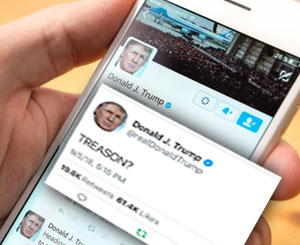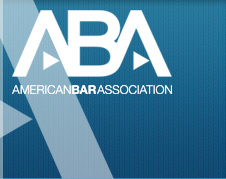Legal View of Treason

“Treason” has become a popular term in today’s lexicon. In July, former CIA Director John Brennan referred to President Donald Trump’s press conference with Vladimir Putin as “nothing short of treasonous." Last month, former Trump advisor David Bossie said former White House staffer Omarosa Manigault Newman “committed treason” against the president by detailing confidential information in her recent book. And on Sept 5, the president himself tweeted “TREASON?” in response to an anonymous senior official’s op-ed in The New York Times that detailed chaos in the White House. But do any of these actions constitute “treason” under the law?
In popular or lay language, the term treason conveys the action of betraying someone or something — in short, disloyalty. As a legal matter, however, treason has a very specific meaning under Article 3, Section 3 of the U.S. Constitution. By law, treason is the betrayal of the U.S. by waging war against it or by consciously acting to aid its enemies. Treason can only be invoked as a criminal charge against an individual with ties to the U.S., in a time of war and when at least two witnesses can testify to an “overt act.”
The Founding Fathers at the Constitutional Convention in 1787 deliberately tailored a narrow definition of treason as a criminal charge, both specifically rejecting the ability of Congress to define treason and setting a high burden of proof. Historians say the framers did so because they recognized that the broad definition of treason in English common law had allowed the charge to be used as a political instrument. Treason is the only criminal offense addressed in the Constitution.
John Marshall, the country’s first chief justice of the U.S. Supreme Court, summed up the Founding Fathers’ concern when he said, “Every member of that Convention — every officer and soldier of the Revolution from (George) Washington down to private, every man or woman who had given succor or supplies to a member of the patriot army, everybody who had advocated American independence — could have been prosecuted and convicted as ‘traitors’ under the British law of constructive treason.”
The First Congress used its constitutional power to establish the punishment for treason – from a minimum sentence of seven years to a maximum sentence of death. Subsequently, Congress modified its penalties, with a conviction now carrying a maximum of death and minimums of five years in jail and a $10,000 fine.
Since 1789, there have been only about 30 treason trials in the U.S. The most famous — considered the trial of the century at the time — involved Aaron Burr in 1807, and it tested the Constitution’s limit on treason. President Thomas Jefferson is said to have pressed for treason charges against Burr, a political opponent, for allegations that he was engaged in a somewhat hazy plot, possibly in cahoots with foreign powers, to get the western territories (at that time, Alabama, Mississippi and some of the Louisiana Territory) to leave the U.S. After a trial presided over by Marshall, a jury acquitted Burr.
Because of the limiting language of Article III, disloyal acts in peacetime often result in charges other than treason. Ethel and Julius Rosenberg, for instance, were charged under the Espionage Act for passing along nuclear weapon designs to the then Soviet Union. While the acts occurred during the Cold War, the U.S. was technically at peace with the Soviets. The Rosenbergs were found guilty in 1951 of espionage conspiracy and eventually executed.
Cases of treason have rarely reached the U.S. Supreme Court. Carlisle v. United States in 1872 established the legal basis that noncitizens living in the U.S. are bound to obey all the laws of the country not immediately relating to citizenship, including the law governing treason.
More than 70 years later, the Supreme Court reaffirmed the narrow legal interpretation of treason in Cramer v. United States. The 5-4 decision involved a German-born, naturalized U.S. citizen who two FBI agents had observed with two suspected German saboteurs who had entered the U.S. by submarine during World War II. The naturalized citizen, Anthony Cramer, was found guilty at trial though the FBI agents, who had the pair under surveillance, could not assert what was said at the meetings. In 1945, the Supreme Court rejected the government’s contention that a “little imagination” would suggest what they talked about. It ruled 5-4 that the evidence was “insufficient to support a finding that the accused had given aid and comfort to the enemy.”
“A citizen intellectually or emotionally may favor the enemy and harbor sympathies or convictions disloyal to this country’s policy or interest, but, so long as he commits no act of aid and comfort to the enemy, there is no treason,” Justice Robert Jackson said in his majority opinion. “On the other hand, a citizen may take actions which do aid and comfort the enemy — making a speech critical of the government or opposing its measures, profiteering, striking in defense plants or essential work, and the hundred other things which impair our cohesion and diminish our strength — but if there is no (commitment) to the enemy in this, if there is no intent to betray, there is no treason.”
Absent the criteria spelled out in Article III, Section 3 of the Constitution, claims of disloyalty don’t meet the legal standard for treason although they can still add, as we have seen, to the realm of political theater.
Posted 2/16/2018 Revised 9/10/18
Other Fact-Checked Subjects:
- Hate Speech
- Flag Burning
- Pardons
- Affirmative Action
- Free Speech
- Ninth Circuit
- Forced Evacuation
- Executive Orders
- National Anthem Controversy
- Gun Laws
- Broadcast Licenses
- Revoking Visas
- Non-Citizen Terrorist Cases
- Religious Displays
- Congressional Seating
- Sexual Harassment
- Revoking Citizenship
- Influencing U.S. Elections
- Legal View of Treason
- Chain Migration
- Guns and Courts
- Students' Right to Protest
- Attorney-Client Privilege
- Recusal
- The President and the Law
- Immigrant Rights
- Revoking Security Clearances
- Confidentiality Agreements
- Resigned or Fired
- Deadly Force
- Birthright Citizenship
- Press Credentials
- Troops at the Border
- Election Re-Vote
- Emergency Powers
- Immigration Law
- Contempt of Congress
- Boycotting 2020 Census
- Electoral College
- Impeachment
- Separation of Powers
- Equal Rights Amendment
- Whistleblower Protection
- Pandemic Authority
- State Powers
- Employer Limits
- Police Immunity
- Federal Forces
- Hatch Act
- Attorney General Authority
- Frivolous Lawsuits
- Social Media and the First Amendment
- D.C. Statehood
- Executive Privilege
- Russian Sanctions
- Law of Genocide
- Stare Decisis
- Declassified




